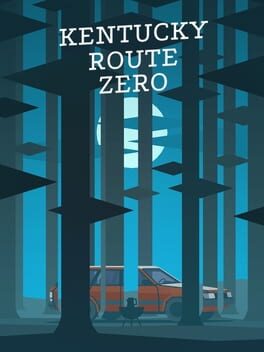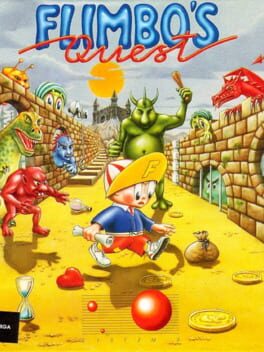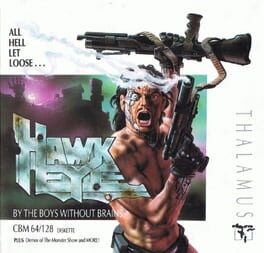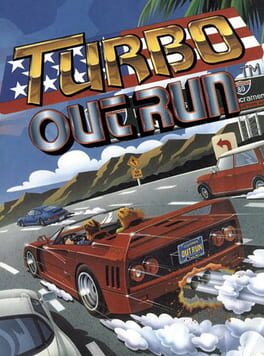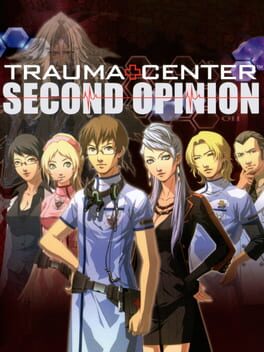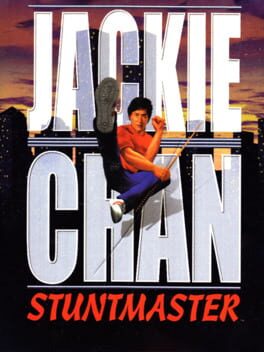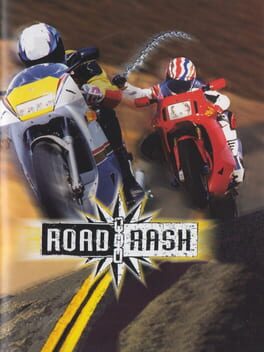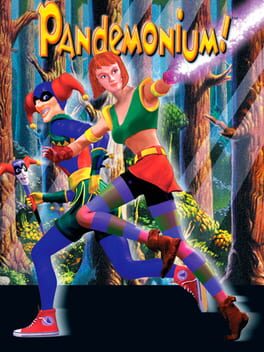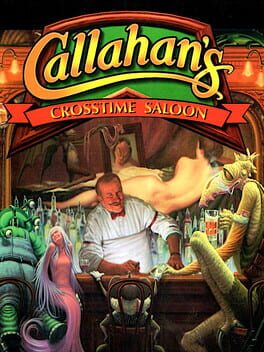AlexV
110 Reviews liked by AlexV
Kentucky Route Zero
2013
Kentucky Route Zero
2013
I love this game. I love the mythology, I love the directing, I love the characters, but above all I love the thoughts that it left me with. For me KRZ succeeds wholly as interactive fiction. It has themes that touch upon the most crucial aspects of what it means to live, to be free, and to die, while weaving a really well thought out vehicle for the conveyance of these things in the writing. KRZ advances the medium in the context of interactive story telling, and in a way that can only be done uniquely as digital art, and this would be the first thing I'd recommend to someone who enjoys reading but might not understand or respect video games.
I'll probably update this review with more thoughts at a later point, but for me this is a must play. Or must read, if you will.
I'll probably update this review with more thoughts at a later point, but for me this is a must play. Or must read, if you will.
Kentucky Route Zero
2013
Comparing games to literature is an exercise in futility, unless we're talking about Kentucky Route Zero. This is one of the best games I've ever played. Heartbreaking, hopeless, hopeful, quiet, beautiful, I just love this game. I played it while I was a new arrival in the UK, without friends and in a place where I felt completely alone. KR0 occupied my thoughts and helped me find hope in a hard time.
Kentucky Route Zero
2013
Kentucky Route Zero
2013
If Townes van Zandt's songs were a game.
A swirl of beautiful, poetic, melancholic musings on the nature of relationships and community and loss and the cosmic absurdity of how any of us - and it - come together in the scattered lands this modern world has left behind in the dust.
I took three years off between Act IV and V and yet the end made me breakdown and cry for the first time in over four years.
A swirl of beautiful, poetic, melancholic musings on the nature of relationships and community and loss and the cosmic absurdity of how any of us - and it - come together in the scattered lands this modern world has left behind in the dust.
I took three years off between Act IV and V and yet the end made me breakdown and cry for the first time in over four years.
Kentucky Route Zero
2013
5 stars not because it's perfect, but because it offers such a novel take on what a game can be. I think it does have some pacing issues in places and it's not something I'll recommend to anyone I know, but I loved it.
It functions like an adventure game without puzzles, but the experience is much closer to reading a novel. So much so that at times it feels unclear why it's an interactive experience at all, but that's also called out in places and thematically tied to the story. The gist of it and its primary thematic content is pretty easy to grasp (I think many reviewers oversell how inscrutable it is), but it absolutely points you towards some deeper thinking with details like the character names.
If you have any interest in the future of games as an art form it's a must play. I think most people should try the first act and only proceed if that grabs them.
It functions like an adventure game without puzzles, but the experience is much closer to reading a novel. So much so that at times it feels unclear why it's an interactive experience at all, but that's also called out in places and thematically tied to the story. The gist of it and its primary thematic content is pretty easy to grasp (I think many reviewers oversell how inscrutable it is), but it absolutely points you towards some deeper thinking with details like the character names.
If you have any interest in the future of games as an art form it's a must play. I think most people should try the first act and only proceed if that grabs them.
Kentucky Route Zero
2013
if only had words... oh god i'm so devasted by this ending. i'm not american, i'm not from kentucky, but all this is so familiar to me. being born at the countryside of a "third-world" country made this story very powerful. i've seen many lives and cities being destroyed by big companies, i've seen many traditions end because of neoliberalism. i just wish world was a better place to all of us.
might be my new favorite game.
might be my new favorite game.
Flimbo's Quest
1990
Hawkeye
1988
I played this when it was released and sadly had to abandon it because it was just too bloody hard. After 33 years I went back and, with the help of infinite lives, finally finished it. Was it worth the wait? Well... yes, mostly.
This game has probably some of the best graphics the C64 saw in its lifetime and the soundtrack is fantastic. Actually, the presentation is next to flawless throughout. The only downsides are the slightly repetitive gameplay and the almost impossible difficulty. Then again, being impossible to complete a game without cheats was pretty much standard for every title back then.
Verdict: it's alright.
This game has probably some of the best graphics the C64 saw in its lifetime and the soundtrack is fantastic. Actually, the presentation is next to flawless throughout. The only downsides are the slightly repetitive gameplay and the almost impossible difficulty. Then again, being impossible to complete a game without cheats was pretty much standard for every title back then.
Verdict: it's alright.
Turbo Outrun
1989
changed my mind on a third go of it - although i cant stress enough how utterly alien it feels if youre playing it after outrun, especially on your first attempt. a lot of the mechanical additions and alterations here admittedly do make sense from a design point of view, especially if one was looking to produce an economical sequel to outrun. why don't we introduce a rival? why don't we introduce a boost? why don't we double down on visual effects? why don't we introduce upgrades? textbook stuff.
unfortunately, while the game can offer small doses of fun, i think it tampers with a sacrosanct formula - one centered largely around purity - far too much for its own good. if i had to chalk it up to a design maxim, i would say the goal in turbo outrun is to 'try to feel cool', whereas in outrun the goal is 'being cool'. crucial difference there. outrun is a skill-based, meditative game that asks you to feel breezy wind pass through your hair and to soak up locales, and it accomplishes this by offering three distinct tone-changing tracks to set whatever mood you feel you can groove to. in turbo outrun's railroaded experience (both mechanically and sonically, you don't get to pick music or routes this time) you're chased by cops, deal with oil slicks, and are harrassed by some punk loser who can steal your girlfriend if youre not driving faster than him. this is madness, sega. she's my girl.
unfortunately, while the game can offer small doses of fun, i think it tampers with a sacrosanct formula - one centered largely around purity - far too much for its own good. if i had to chalk it up to a design maxim, i would say the goal in turbo outrun is to 'try to feel cool', whereas in outrun the goal is 'being cool'. crucial difference there. outrun is a skill-based, meditative game that asks you to feel breezy wind pass through your hair and to soak up locales, and it accomplishes this by offering three distinct tone-changing tracks to set whatever mood you feel you can groove to. in turbo outrun's railroaded experience (both mechanically and sonically, you don't get to pick music or routes this time) you're chased by cops, deal with oil slicks, and are harrassed by some punk loser who can steal your girlfriend if youre not driving faster than him. this is madness, sega. she's my girl.
Considering this was a launch title for the Wii, it's remarkably accurate in following your Wii remote. I start with this, because that's going to be one of the deal breakers with nearly any Wii game, so this crosses the most basic hurdle.
A surgery sim by way of anime, Trauma Center Second Opinion, makes medicine make sense to layman enough to be very easily accessible, despite the constant medical jargon being thrown around. The entire story is told in static visual novel stills, with no voice acting, and while I don't think it does the game any favors, the soundtrack is solid, and the background art pretty to look at. There's always a sense of comfort I get from playing this game, the low key nature of the story scenes is an excellent break from the sometimes overwhelming difficulty of the surgery. The narratives contained within are universally simple but a chance to see a group of people being shonen about murdering an evil sentient virus that builds a spiderweb or some shit, is one that doesn't come up often in media in general, let alone video games
And this is just about the perfect console for Trauma Center, with the series as a whole still being one of the shining examples of creative use of the motion controls, and the series never even needed Wii Motion Plus to do it. With the razor thin margins you can get by on the hard difficulties in later missions, even something as simple as the Wiimote's pointer functionality becomes uncannily compelling, forcing me to actively watch for any shaking as I carefully reattach a vein or laser a burrowing virus-snake. Later missions forced me down from hard on a handful of occasions, but there is no restriction on changing the difficulty, so getting stuck at a certain part of the story is generally not an issue. Good luck with those X missions though, shit's locked at Xtreme difficulty, lol.
The gameplay is backed up by a banger of an OST, there aren't too many overall tracks, but all of them are good, and all of them pull their weight in setting the moods during the campaign. There's a huge change in feel between Hope Hospital and Cadeceus, and it's solely through a change of a handful of stills and music. I love how much of my imagination I need to use to flesh out the story, while still being given some very basic anchor points.
You can find this game pretty cheap for now, so I'd definitely get it and the rest of the series while the getting is good. It's about a 15 hour long campaign for a first time through, accounting for failing a lot, which is pretty good bang for your buck.
A surgery sim by way of anime, Trauma Center Second Opinion, makes medicine make sense to layman enough to be very easily accessible, despite the constant medical jargon being thrown around. The entire story is told in static visual novel stills, with no voice acting, and while I don't think it does the game any favors, the soundtrack is solid, and the background art pretty to look at. There's always a sense of comfort I get from playing this game, the low key nature of the story scenes is an excellent break from the sometimes overwhelming difficulty of the surgery. The narratives contained within are universally simple but a chance to see a group of people being shonen about murdering an evil sentient virus that builds a spiderweb or some shit, is one that doesn't come up often in media in general, let alone video games
And this is just about the perfect console for Trauma Center, with the series as a whole still being one of the shining examples of creative use of the motion controls, and the series never even needed Wii Motion Plus to do it. With the razor thin margins you can get by on the hard difficulties in later missions, even something as simple as the Wiimote's pointer functionality becomes uncannily compelling, forcing me to actively watch for any shaking as I carefully reattach a vein or laser a burrowing virus-snake. Later missions forced me down from hard on a handful of occasions, but there is no restriction on changing the difficulty, so getting stuck at a certain part of the story is generally not an issue. Good luck with those X missions though, shit's locked at Xtreme difficulty, lol.
The gameplay is backed up by a banger of an OST, there aren't too many overall tracks, but all of them are good, and all of them pull their weight in setting the moods during the campaign. There's a huge change in feel between Hope Hospital and Cadeceus, and it's solely through a change of a handful of stills and music. I love how much of my imagination I need to use to flesh out the story, while still being given some very basic anchor points.
You can find this game pretty cheap for now, so I'd definitely get it and the rest of the series while the getting is good. It's about a 15 hour long campaign for a first time through, accounting for failing a lot, which is pretty good bang for your buck.
While short and clunky in a lot of ways, the game mechanics work consistently enough (for a PS1 game, still expect to fall through shit sometimes tho) that the surprisngly in depth combat system and even the platforming take on a very unique charm that really feels like a "Jackie Chan" game. Character models are some of the most basic I've seen on the system, but the game offsets this by having some of the best animation work, both in the FMVs and in-game engine. Jackie actually did MoCap for this and it shows, A big grin came over my face when I realized you could go Drunken Fist Jackie. This game does have difficulty spikes that can make progression tedious and difficult, due to a lives system (tho this can be partially offset by collecting enough gold dragons to unlock the Shaolin Temple, which is a great spot to quickly farm lives.) and once all collectables and levels are completed, there's nothing much to see or revisit, but it's a fun ride while it lasts, and I wish more movie martial artist focused games got the kind of love this did.
Road Rash
1994
In high school I briefly roomed with a dude who had this on his PC. Having recently played the three Genesis titles on a trip down memory lane, I decided it wouldn't be complete without this, and after being very underwhelmed with the former, I'm very glad I played this! This is what the earlier games wanted to be but couldn't because of hardware limitations. Much farther draw distance, tighter controls and better handling make for an infinitely more satisfying experience. There's still some cheap bullshit in terms of hazard placement but it's a lot less common, and thanks to the better controls, whenever I crash I always think "ah well, I screwed up" rather than blaming it on the framerate or the hit detection. In another welcome upgrade, the other racers now feel much more like other people - they crash a lot more often, and either stay out of your way or attack you aggressively depending on how you treated them before. This, combined with the much more solid racing mechanics, make a 'pacifist' run of the game not just possible but actually rewarding (of course, the combat is very fun too!)
Besides the stuff that the better hardware made possible, this game has something that is so glaringly missing from the earlier entries that I'll have to retrospectively dock them each half a star: variety of road widths. There are a lot of city segments here with wider roads in which the focus is on zooming in and out of multiple lanes while avoiding denser-than-usual traffic, as opposed to the three Genesis games in which every single track was comprised of narrow two-lane roads that get progressively snakier and snakier. The track variety is very welcome here, and I much prefer the wider roads: the action is much more fun when you can focus on the hazards and the combat without worrying about flying offroad and crashing at any moment. It's no coincidence that the Pacific Coast Highway (the narrowest and snakiest track) is the one I found most frustrating.
The great game feel is supplemented by a banging soundtrack (though more tracks would have been welcome). The cutscenes are endearingly cringey - one of my favorites involves a cop goofing off with donuts and coffee, and a Rasher riding past and smacking the coffee into his face - his look of utter betrayal is priceless. The heavily stylized art is a departure from earlier titles and is a bit of an acquired taste, but very distinctive nonetheless.
The game is still not perfect. I don't understand why they didn't have a separate button for nitro boosts; it's too easy to accidentally activate a nitro by doubletapping the accelerator. More notably, the physics for when two or more racers cluster together is finicky and difficult to predict. But this was the first game in the series where upon completing the last level, my reaction wasn't "whew, I'm done!" but instead to buy the most expensive bike and go a few more rounds. Excellent stuff!
Besides the stuff that the better hardware made possible, this game has something that is so glaringly missing from the earlier entries that I'll have to retrospectively dock them each half a star: variety of road widths. There are a lot of city segments here with wider roads in which the focus is on zooming in and out of multiple lanes while avoiding denser-than-usual traffic, as opposed to the three Genesis games in which every single track was comprised of narrow two-lane roads that get progressively snakier and snakier. The track variety is very welcome here, and I much prefer the wider roads: the action is much more fun when you can focus on the hazards and the combat without worrying about flying offroad and crashing at any moment. It's no coincidence that the Pacific Coast Highway (the narrowest and snakiest track) is the one I found most frustrating.
The great game feel is supplemented by a banging soundtrack (though more tracks would have been welcome). The cutscenes are endearingly cringey - one of my favorites involves a cop goofing off with donuts and coffee, and a Rasher riding past and smacking the coffee into his face - his look of utter betrayal is priceless. The heavily stylized art is a departure from earlier titles and is a bit of an acquired taste, but very distinctive nonetheless.
The game is still not perfect. I don't understand why they didn't have a separate button for nitro boosts; it's too easy to accidentally activate a nitro by doubletapping the accelerator. More notably, the physics for when two or more racers cluster together is finicky and difficult to predict. But this was the first game in the series where upon completing the last level, my reaction wasn't "whew, I'm done!" but instead to buy the most expensive bike and go a few more rounds. Excellent stuff!
Pandemonium!
1996
A trip down memory lane to a 2.5D platformer I played a ton of as a child.
Coming back to it in my 30s and with a keener eye for the details, a number of the game's flaws become a lot more apparent, with the camera being as much an enemy to overcome as anything else.
Nikki's double jump seemingly works on a system of "Nah, don't feel like it this time" that would see me careen to my death multiple times, and fuck me the last third of this game is up there with some of the tougher platformers ever.
With that said, plenty of creativity in level design and music with multiple segments over the course of a single level. While the models and 3D assets look as you'd expect for a game from 1996, the pre-backgrounds are pretty impressive and underrated.
Coming back to it in my 30s and with a keener eye for the details, a number of the game's flaws become a lot more apparent, with the camera being as much an enemy to overcome as anything else.
Nikki's double jump seemingly works on a system of "Nah, don't feel like it this time" that would see me careen to my death multiple times, and fuck me the last third of this game is up there with some of the tougher platformers ever.
With that said, plenty of creativity in level design and music with multiple segments over the course of a single level. While the models and 3D assets look as you'd expect for a game from 1996, the pre-backgrounds are pretty impressive and underrated.
The mountains of goofy and expository flavor text on every little speck or item or character in the game and the mostly pointless, but endlessly entertaining dialogue trees goes a long way inviting a habitual, laid-back sense of play that invokes the pleasures of hanging out in the way the wanderlust nature of the best western adventure games do best.
